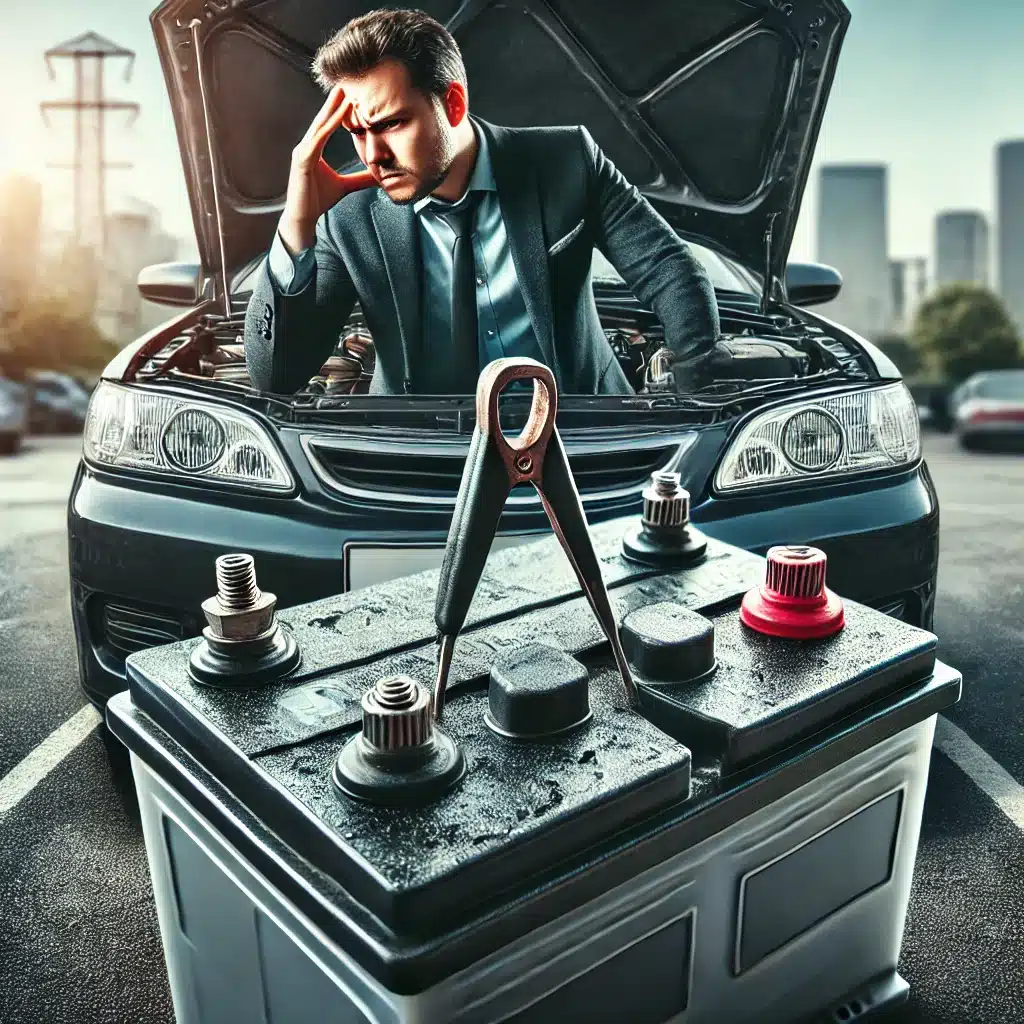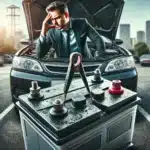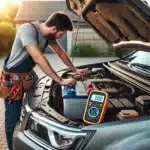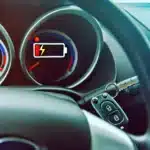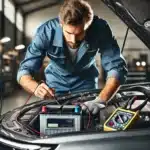Table of contents
- what drains a car battery
- 1. Faulty Alternator
- 2. Old or Worn-Out Battery
- 3. Parasitic Drain
- 4. Short Trips and Frequent Stops
- 5. Loose or Corroded Battery Terminals
- 6. Extreme Weather Conditions
- 7. Leaving Accessories On
- 8. Defective Electrical System
- 9. Undercharged Battery
- 10. Poor Quality Battery
- 11. Faulty Starter Motor
- 12. Ignoring Warning Signs
- How do I stop my battery from draining so fast?
Are you encountering issues with your battery, too? In that case, is your car battery constantly dying? A battery can die, but car mechanics say if it happens more often than it should, there could be underlying issues with the car.
Additionally, if a car refuses to start when you are ready to go, that can also be anger-causing. So, the ultimate question is, why does my car battery keep dying? The answer is slightly complicated as there is no singular reasoning behind this.
what drains a car battery
To begin with, let us get one thing out of the way: a faulty battery isn’t always the car’s fault. More often than not, the car stopping to work is a result of a host of reasons, such as an old battery, an electrical fault or bad habits; make sure to keep an eye out on what may be the reason in the first place.
Now, The way a car battery works is pretty simple: for a car to start, it has to be properly functioning, so without a battery, it would be pretty hard to get a car on the road. But it is more than just starting a vehicle; your battery is responsible for powering things around, like the radio, lights, and other critical electric components. Most people can tell when their battery starts getting old because it dies more than it should, indicating you need more profound help.
1. Faulty Alternator
The alternator plays a vital part in maintaining the life of your battery. If it is malfunctioning, then your battery is going to die frequently. An alternator aids in recharging the battery when the engine is working. If your alternator is damaged or not functioning correctly, your battery will inevitably die as the battery is not being recharged while the engine is on.
Incessant dimming of headlights or a yellow light on the dashboard can be a warning sign. A more common way to look at it is that your car or its alternator can only charge the battery so much. After that, it gets defunct. Everything has a limit to its capability because filling a leaking bucket with water makes no sense once this limit is reached.
Solution:
- Replace batteries that are over 3–5 years old.
- Seek advice from a mechanic to determine if your battery needs replacing.
2. Old or Worn-Out Battery
If you’re wondering why your battery has been dying now and then, then the reason can be pretty straightforward. It has reached its age boundary. Beaumont batteries are the same as any other item that can become obsolete with time. After a specific time frame, batteries might cease to sustain a charge. The average life expectancy of a battery is three to five years. If you estimate the average, then by five years, the battery’s efficiency will deteriorate. If you’ve had your battery for a while, replacing it might be time or overdue. An expert or experienced mechanic can assist you in understanding timeless batteries and if one needs replacing.
Solution:
- Replace batteries that are over 3–5 years old.
- Seek advice from a mechanic to determine if your battery needs replacing.
3. Parasitic Drain
Can something consume your battery even when the engine is off? Of course, that would be the case with parasitic drains. Various battery management system components, such as the alarm system and clock, use energy even if the vehicle is turned off and on standby. When left unattended, the drain will have little impact on the battery. A defective light, fuse, or circuit is a potential failure with one of these components; any problems can result in quicker battery consumption. You can check for parasitic drains with the help of mechanics as well.
Solution:
- Use a mechanic to identify parasitic drains caused by faulty circuits, lights, or fuses.
- Address and fix malfunctioning electrical components to reduce battery drain.
4. Short Trips and Frequent Stops
If that’s the case, short journeys take a toll on your battery. The logic is obvious: short distances do not allow the alternator to meet its entire obligation, which is to charge the battery. Imagine constantly shutting off and restarting the engine; your battery may not recharge sufficiently. Make longer journeys every once in a while, which helps recharge the battery. Another great tip is never to use electrical accessories such as air conditioners or radios during short trips.
Solution:
- Avoid frequent short trips that prevent the battery from recharging.
- To give the alternator time to recharge the battery, take longer trips from time to time.
- Minimize using electrical accessories like the radio or air conditioning during short trips.
5. Loose or Corroded Battery Terminals
But, if the battery’s terminals are corroded or loose, this could also lead to your car battery dying. Make sure that connections between the battery and your vehicle’s electrical system are in place, as loose connections won’t allow your vehicle battery to function correctly. Another reason to rule out is the corrosion around the battery terminal; this substance can kill the flow of electricity, leading to your vehicle battery dying.
If the battery terminal is hoarding corrosion, use baking soda and water, but tightening it for loose battery terminals is best. If you want to prolong the life of your battery, then checking the battery terminals regularly could help you ensure the vehicle battery is operating correctly.
Solution:
- Regularly inspect battery terminals for corrosion or looseness.
- Clean corroded terminals with a baking soda and water solution.
- Tighten loose terminals to ensure proper electrical flow.
6. Extreme Weather Conditions
Have you ever forgotten to change the oil in your car? You won’t; winter is when most people leave their batteries unattended, and just like oil, they tend to die faster in the winter. Car battery voltage always suffers in the cold, so if you expect your battery to perform under these conditions, delivering the performance in a cold environment would be hard. Too-hot weather does the opposite; the battery tends to overheat, so it fails. After all, perishables tend to rot the closer they are to heat. If you know the area you currently reside in has wildfire hours, then make sure your battery is monitored regularly.
Solution:
- In cold weather, ensure the battery is fully charged to avoid performance issues.
- In hot weather, monitor the battery to prevent overheating and degradation.
- Store the car in a garage or shaded area to protect the battery from extreme temperatures.
7. Leaving Accessories On
Have you inadvertently left your headlights or the interior lights on for the entire night? If yes, we understand how painful it feels to wake up to a completely drained battery the following day. Any device used while the car is turned off, such as radios, lights, heated chairs, and anything else, will drain the battery. It is an understandable mistake, but something so trivial can easily be avoided by checking to ensure everything is turned off when getting out of the car.
Solution:
- Turn off headlights, interior lights, and electrical devices when the car is off.
- Double-check that all accessories are switched off before leaving the car.
8. Defective Electrical System
The third reason car batteries stop functioning is an electrical or system malfunction. Problems related to the car’s wiring, fuses, and other electrical components can cause excessive power loss or failure to charge a car’s battery. If you suspect something is wrong with your car’s electrical system, always seek help from specialists to solve the malfunction. They are equipped to test for faults in the system that lead to sudden battery loss.
Solution:
- Have a professional inspect the car’s wiring, fuses, and electrical components if issues persist.
- Repair any faults that could lead to excessive power loss or improper charging.
9. Undercharged Battery
The battery in your car can also run out of charge and stop working. There might be an issue with the alternator, or you may have a habit of making many short trips, which means the battery is not fully charged. And if left unattended, a battery may lose its capacity to hold a charge. However, consistently running the vehicle longer distances can help avoid this problem. Even better, run a short battery test at home to check if it accepts charge correctly since if everything else seems alright with the vehicle and you are having this problem, it may be due to the battery itself.
Solution:
- Avoid short trips and allow the alternator to charge the battery fully.
- Perform a battery test to check if it can hold a charge properly.
10. Poor Quality Battery
Due to their low capacity, vehicles with noticeably old batteries may show signs of power inefficiency. If you’ve recently changed your car’s battery, and it continues to show signs of being deficient in power, likely, the replacement provided wasn’t up to scratch. Several kinds of batteries are substandard and are made of looser quality, which end up damaging quickly. While looking for the cheapest batteries may be a reasonable choice, in the long run, getting a better quality battery will avoid all the frustration while saving you plenty of money. Consult your attendant on what reliable battery brands can be recommended.
Solution:
- Invest in a high-quality, reliable battery instead of opting for cheaper alternatives.
- Consult a professional to recommend durable and dependable battery brands.
11. Faulty Starter Motor
If you believe the battery is still working well, but the car won’t turn on, your problem might be the starter motor. The starter motor within your vehicle is responsible for reaching the ignition. If the starter motor is malfunctioning, it can cause the battery to get used quickly, as the car will have difficulty getting turned on. If the alternator and the battery have been eliminated as the cause, it makes sense to check the starter motor next.
Solution:
- Check the starter motor for issues if the car won’t start, but the battery is OK.
- Consult a mechanic to repair or replace a malfunctioning starter motor.
12. Ignoring Warning Signs
A car’s battery sometimes can drain, giving all kinds of alerts, but we tend to ignore the alerts. Some dimming lights, the lights taking longer to turn on the engine, or some disturbances during the ignition are all potential indicators of vehicle battery failure. If you are experiencing these problems and don’t attend to them, the car’s battery can be drained, and you could be left out. I recommend examining the car’s battery and electrical system before the problem gets more serious if you notice that your vehicle is not running as it should.
Solution:
- Pay attention to warning signs such as dim lights, delayed ignition, or dashboard alerts.
- Regularly examine the car’s battery and electrical system for potential problems.
- Address any issues early to prevent more severe damage or breakdowns.
How do I stop my battery from draining so fast?
1. Check the Alternator
One reason for battery loss can be improper alternator-belt attachment. Make sure the alternator is attached securely while the vehicle is running. The alternator and the battery are important car components. While the former generates power, the latter stores it. Any malfunction of these components causes the battery to waste quickly or never charge.
2. Turn Off Accessories
As long as the car is switched off, make sure the lights, radio, and air conditioning are also switched off. If they are left on the vehicle, even if it is turned off, the battery can become fully discharged.
3. Replace an Old Battery
If your battery is a few years old, it is likely worn out and cannot hold a charge. Buying a new, high-quality battery and replacing the old one will fix the battery dying problem.
4. Check for Parasitic Drains
Some electrical devices in a car draw current even if the car is off. These devices include the alarm system, clock, radio, etc. They could also malfunction, draining the battery. The mechanic should be able to test for parasitic drains.
5. Tighten Battery Terminals
Terminals that are loose or have corrosion cannot conduct electricity correctly, resulting in rapid battery loss. Ensure the terminals are clean and tightened to their correct torque increments.
6. Avoid Short Trips
A brief drive may not help charge the battery as per the alternator, so try to avoid using the battery for prolonged amounts of time during the day and instead avoid unnecessary trips.
7. Inspect for Electrical Issues
If the wiring or fuses are faulty, it may lead to a disbalance in the power supply. If the wiring and fuses are not working correctly, you should get the device checked out.
Key Takeaways
Here are the main points you should remember:
- Faulty alternators and parasitic drains are common reasons for car battery issues.
- Extreme temperatures can significantly affect battery performance.
- Unexpected battery failures can be avoided with quick battery testing and routine maintenance.
- After three to five years, a weak battery should be replaced since it may not be able to keep a charge.

